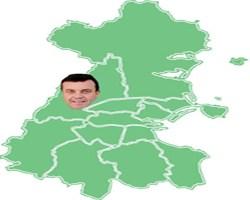The last of the Dublin rogues?

Of all Fianna Fáil's defeats in the elections, perhaps the one of greatest historical significance was its being wiped off the map of the capital city, with only one utterly discredited TD remaining. Being a 'Dublin rogue' was once enough for the loyal city's population to forgive just about anything, but that knowing regard is gone. Donal Fallon gives us a sense of the historical significance of the Dublin defeat.
Though it pains many of us on the left to say so, perhaps the greatest 'grassroots movement' in the capital historically is the Fianna Fáil party.
Indeed, many gains made by Sinn Féin in the recent election are in areas where Fianna Fáil had a strong, and a traditionally working class, vote to rely on. Today, Dublin West is the only Dáil constituency in the capital with a Fianna Fáil TD and Brian Lenihan was elected without even reaching the quota. When coupled with the loss of a Dublin MEP in 2009, to an anti-establishment figure like Joe Higgins no less, the collapse of the party in Dublin is unprecedented.
Fianna Fáil had, Sean Lemass told a gathering of youth party members in Inchicore in November 1947, "more wage-earners in its ranks than any Labour Party, and more farmers than any Farmers' Party". The class make-up of the party in Dublin was always a matter of considerable pride, when coupled with the historic roots of the party in the anti-treaty IRA. In 1954, when a young Charles Haughey was put before the people as a part of the 'New Guard' of the party, he shared space on his inaugural election leaflet with Oscar Traynor and Harry Colley. Traynor was among the most highly regarded of the 'men of Easter Week', serving in the Metropole Hotel with the GPO Garrison during the rising. Harry Colley, the leaflet noted, had been "left for dead at a Dublin street barricade". Almost 40 years on from the rising, Fianna Fáil was still presenting itself as the party, and indeed the vanguard, of Irish republicanism. New candidates like Haughey often came from the same bloodline as many of the 'Old Guard'.
There is the impression in Irish politics that the 'family seat' is a rural peculiarity, but things are no different in urban Dublin. The Haughey and Andrews dynasties in particular would have been seen by many as unshakable. One of the most striking results of the recent election was the loss of the 'Haughey seat' coupled with the collapse of the Ahern machine, where even a letter from 'De Man Himself' couldn't save Cyprian Brady.
It is fair to say that historically the basis of Fianna Fáil's strength was an alliance of the urban working class with rural farmers. Commenting on the 1992 election, which saw Fianna Fáil experience losses in the capital, Conor Cruise O'Brien noted that Fianna Fáil's base being largely rural represented perhaps the "biggest change in the pattern of Irish politics, certainly since 1948, and possibly since 1932". Then, as now, it was undeniable that the scandal which surrounded Fianna Fáil in times just past played a huge factor in their urban losses. Dubliners, Cruise O'Brien noted, could forgive Charles J. Haughey of a lot. "Charlie might perhaps be a bit of a rogue, but he is a Dublin rogue." But even a Dublin rogue, who placed such emphasis on the parish pump end of politics, could only be forgiven for so much.
Historically, one must remember the party had come through the rocky 1980s, another period of economic disaster and emigration, with a first preference result across five elections that appeared almost rock solid. Fintan O'Toole commented in the Irish Times in 2004 that historians in decades to come will be forgiven for presuming this was a decade of economic stability, with Fianna Fáil poll performances of 45%, 47%, 45%, and 44%. It was, O'Toole wrote, "a feck-the-begrudgers party". It commanded a sense of loyalty and had strong local structures, organisation, fundraising and perhaps most importantly of all a feeling of historical inheritance.
The political landscape of Dublin has changed. The United Left Alliance now boasts four TDs in the capital, and indeed will retain that MEP seat taken from Eoin Ryan of Fianna Fáil. Bertie Ahern's run for the Phoenix Park is no longer seen by anyone as a credible scenario, and as more than a few poll-observers on the likes of politics.ie observed it is no longer staunch party activists but hired teams that put up and remove the election posters of the party with "more wage-earners in its ranks than any Labour Party, and more farmers than any Farmers' Party".
In 2004, as in this election, the predicted gains for Sinn Féin were to come from Fianna Fáil Dublin heartlands. The party will be seen as toxic for at least another decade one would presume. It was an associate of Bertie Ahern, Jerry Beades, who late last year commented on the need for a 'root and branch reform' of the party. Interestingly too, in Dublin, Averil Power was one of the few Fianna Fáilers who performed well and seemed in contention for a seat. On her website and in her election materials, Power noted that "Mistakes such as failing to regulate the banks and over-dependence on construction have caused real hardship for people and for those we must be truly sorry." She was among the first Fianna Fáil candidates to move away from 'tough decisions had to be made' to anything even approaching an apology.
If any sort of grassroots reform of the party does come, one can presume Dublin members of the party will be to the fore. The historic annihilation of Fianna Fáil in Dublin was, up until recently, hard to imagine, but this may be just the end of one chapter and the beginning of another for a resilient party with a fascinating and complex history.
Image top: Donal Fallon
